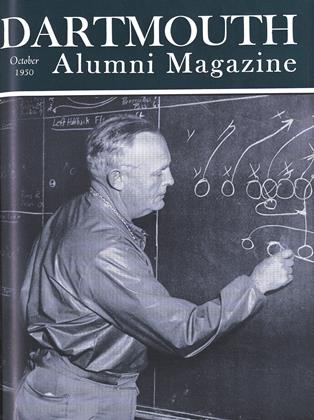In the September Atlantic, Dartmouth alumnus Edward Weeks (Litt.D. '50) writes: "Now it seems we are all heading for trouble again For the third time and so soon."
All during the summer, college officials throughout the country had the same thought and wondered to what extent their students and institutions would become involved. On the eve of the opening of the new academic year, the answer seems to be that for the present at least the enrollment in colleges will not be drastically affected by the war in Korea.
Among Dartmouth upperclassmen scheduled to return to college this fall there have been some withdrawals for military service, mostly in the Marine Corps Reserve, but the number has been small and the attrition in enrollment over the summer is expected to approximate 35 men for all reasons. Far more summer activity in the offices of the Dean and Registrar has been caused by letters from students requesting official evidence that they are in good academic standing and therefore eligible for draft deferment. Selective Service headquarters ruled in August that students 21 or over, if called before September 15, could apply for deferment provided they stood in the upper half of their class last year, and that students under 21 were not likely to be called at this time. Once the college year has started, students either beginning or continuing their college education will be deferred for military service until June 1951, unless dropped from college for academic or other reasons. The effect of all this on the incoming freshman class is negligible since practically all members of the Class of 1954 are below the draft age of 19. Only two cases of men not matriculating can be attributed directly to the war, according to the Admissions Office.
After the college year is under way, en rollment is likely to fall off to some extent, not only because of men enlisting but also because of the possible calling up of men who now have a reserve status in the various branches of the service. The Department of Defense has announced that student reservists in good standing may request a delay in active duty if called, but that such delay will normally not go beyond the end of the semester. On the enlistment side, some students reaching 21 and eligibility for the draft can be expected to enlist in order to have a choice as to the branch of the armed forces in which they serve.
Perhaps the most concrete instance of the Korean war's impact on the College thus far involves the Dartmouth NROTC Unit. Into the Crosby Hall offices presided over by Captain Willard M. Sweetser, USN, have poured an unusually large number of inquiries about joining the Unit as a "contract" student (men selected for NROTC after entering college in cotrast to "regular" NROTC students who are selected in a nation-wide competition and enter college as Midshipmen receiving Navy pay). On the strength of NROTC interest constantly shown at Dartmouth, the College's quota for new contract students this fall has been increased to 70, and there probably will be twice that many candidates for these places after physical examinations weed out some number of the applicants. To the 70 contract trainees will be added 40 new regular students, giving the Dartmouth Unit a total of approximately 280 men, an increase of 60 over last year and a close approach to its top limit of goo men. Navy policy for the present indicates no expansion of its NROTC program such as has been announced by the Army.
Although few tangible effects of the Korean strife have developed in Hanover up to now, there can be no doubt that when the entire College assembles in Webster Hall for Convocation on the morning of Wednesday, September 27, it will do so under the shadow of a serious international situation that could easily spread into another world war—"for the third time and so soon." Whether or not the fighting in Korea continues, the impact of die world struggle is bound to be felt in classroom and campus life during this 182 nd year of Dartmouth's free existence. Along with it, however, as football practice and other normal signs indicate, the shadows will be balanced by many of the bright and joyful things that make the Hanover fall a season apart and the start of a new college year always a time of great and refreshing expectations.
 View Full Issue
View Full Issue
More From This Issue
-
 Sports
SportsFINIS
October 1950 By Bernard G. Sykes '51 -
 Article
ArticleMan on the Job . . . for Thirty Years
October 1950 By JOHN HURD '21 -
 Class Notes
Class Notes1918
October 1950 By ERNEST H. EARLEY, DONALD L. BARR, DAVID L. GARRATT -
 Class Notes
Class Notes1923
October 1950 By TRUMAN T. METZEL, COLIN C. STEWART 3RD, JULIUS A. RIPPEL -
 Class Notes
Class Notes1905
October 1950 By GEORGE W. PUTNAM, GILBERT H. FALL -
 Article
ArticleTHERE'S METHOD Behind the Fall Madness
October 1950 By ROGER K. WOLBARST '43
C. E. W.
-
 Article
ArticleGym Talk: The Three Skippers
March 1934 By C. E. W. -
 Article
ArticleA Postwar Guarantee
December 1943 By C. E. W. -
 Article
ArticleThe Admissions Problem
June 1947 By C. E. W. -
 Article
Article4.0 Is Only Good
June 1952 By C. E. W. -
 Article
ArticleIn Brief . . .
June 1952 By C. E. W. -
 Article
ArticleTHE COLLEGE
November 1953 By C. E. W.







